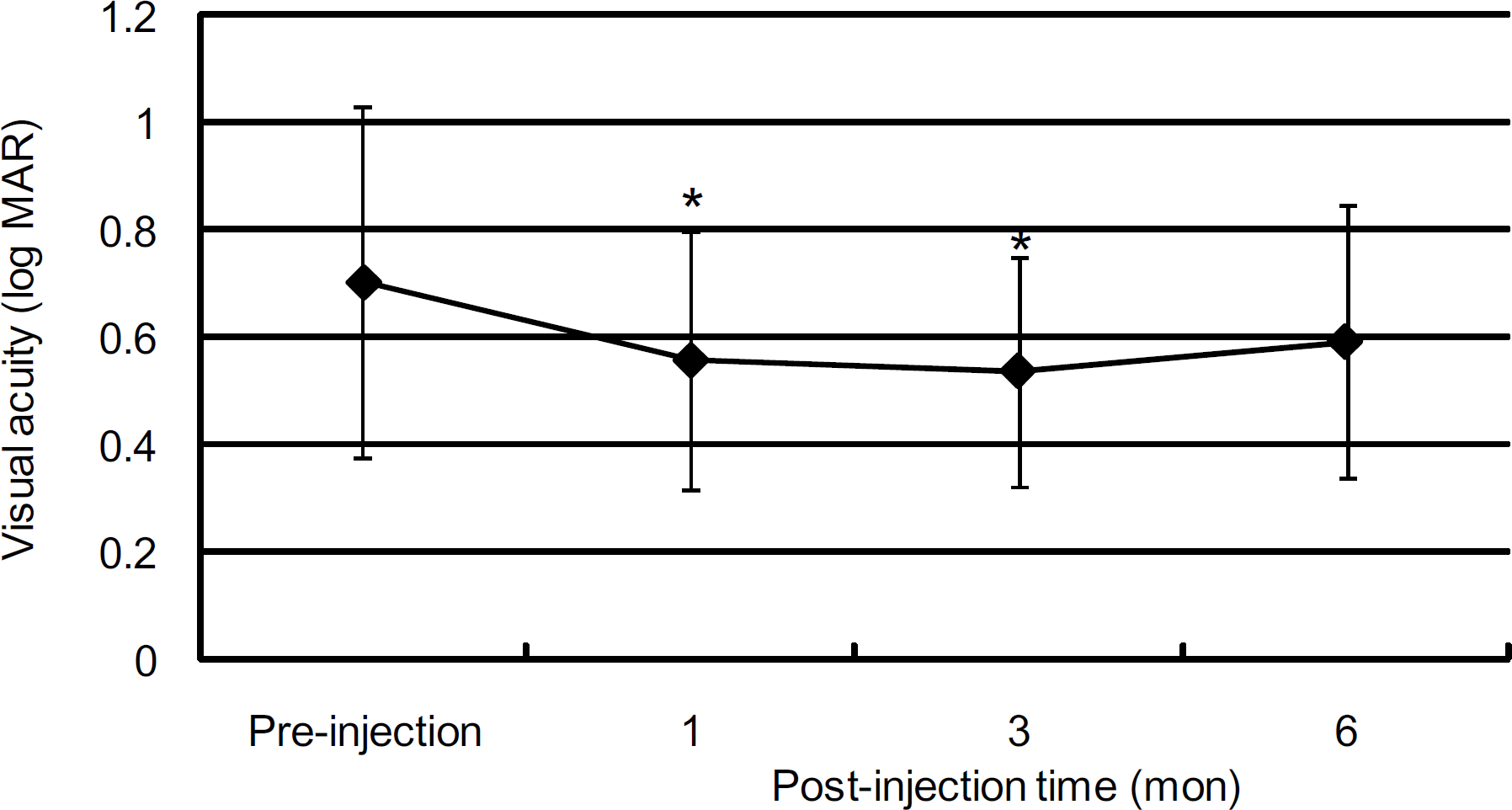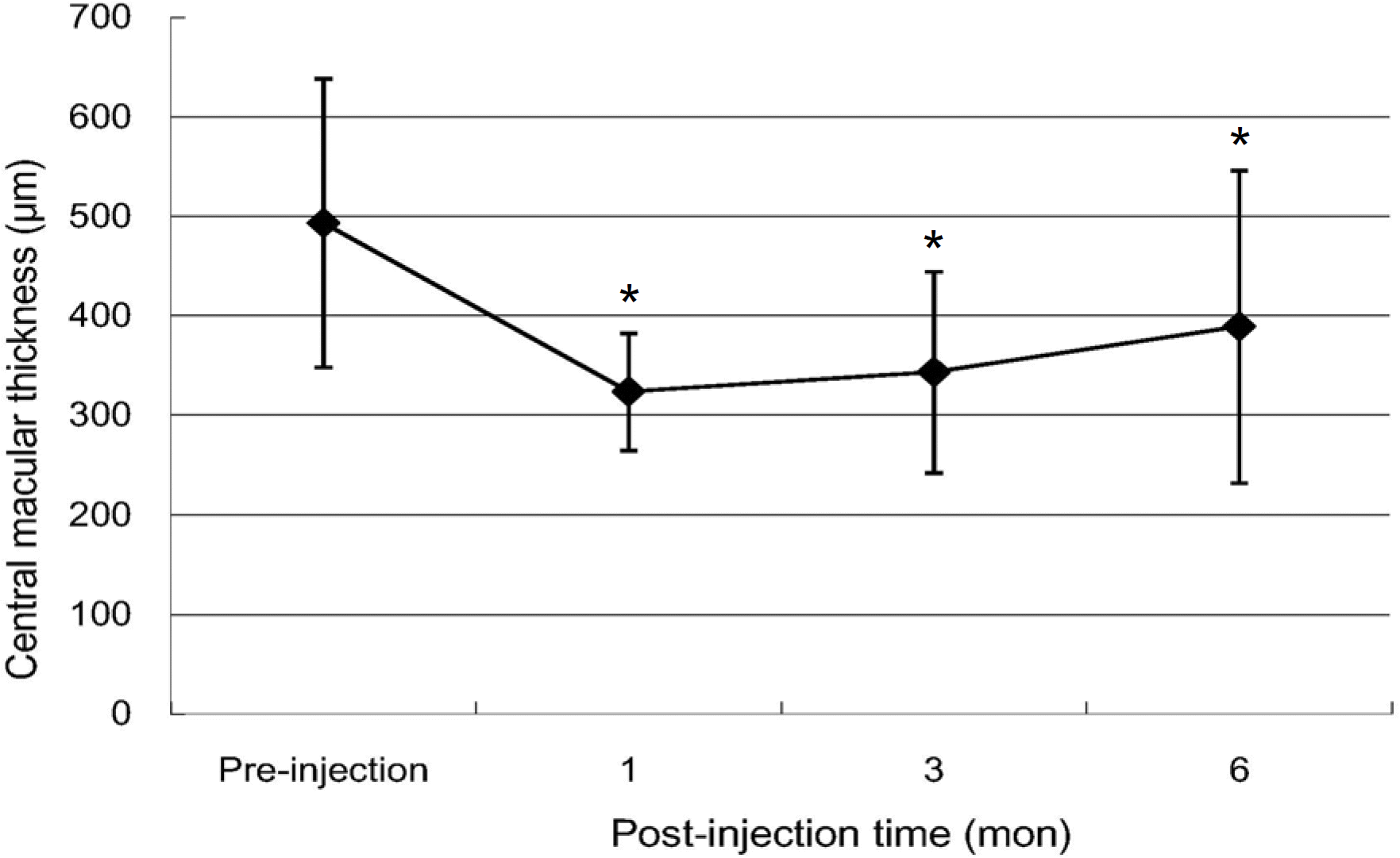Abstract
Purpose
To evaluate the effect of posterior subtenon injection of triamcinolone acetonide (TA) in patients with refractory diabetic macular edema (DME) after vitrectomy.
Methods
Seventeen vitrectomized eyes in 16 patients with DME underwent a posterior subtenon injection of TA (40 mg/1.0 ml) and were followed-up for more than six months. Visual acuity (VA, logMAR) and central subfield macular thickness (CSMT, μ m) according to optical coherent tomography were assessed at baseline and 1, 3, and 6 months after an injection of TA.
Results
The patients included four men and 12 women with an average age of 56.9 years. VA improved significantly from 0.70 ± 0.33 (mean ± SD) before injection to 0.56 ± 0.24 one month and 0.54 ± 0.21 three months after an injection of TA. Visual acuity at six months was 0.61 ± 0.24 and had no significance (p = 0.17). CSMT decreased significantly from 469 ±145 before injection to 323 ± 58, 343 ± 100, and 389 ± 156 one, three, and six months after an injection of TA, respectively.
References
1. Photocoagulation for diabetic macular edema. Early Treatment Diabetic Retinopathy Study report number 1. Early Treatment Diabetic Retinopathy Study research group. Arch Ophthalmol. 1985; 103:1796–806.
2. Treatment techniques and clinical guidelines for photocoagulation of diabetic macular edema. Early Treatment Diabetic Retinopathy Study Report Number 2. Early Treatment Diabetic Retinopathy Study Research Group. Ophthalmology. 1987; 94:761–74.
3. Focal photocoagulation treatment of diabetic macular edema. Relationship of treatment effect to fluorescein angiographic and other retinal characteristics at baseline: ETDRS report no. 19. Early Treatment Diabetic Retinopathy Study Research Group. Arch Ophthalmol. 1995; 113:1144–55.
4. Jampol LM. Pharmacologic therapy of aphakic cystoid macular edema. A review. Ophthalmology. 1982; 89:891–7.
5. Pendergast SD, Hassan TS, Williams GA, et al. Vitrectomy for diffuse diabetic macular edema associated with a taut premacular posterior hyaloid. Am J Ophthalmol. 2000; 130:178–86.

6. Martidis A, Duker JS, Greenberg PB, et al. Intravitreal triamcinolone for refractory diabetic macular edema. Ophthalmology. 2002; 109:920–7.

7. Haritoglou C, Kook D, Neubauer A, et al. Intravitreal bevacizumab (Avastin) therapy for persistent diffuse diabetic macular edema. Retina. 2006; 26:999–1005.

8. Shimura M, Nakazawa T, Yasuda K, et al. Comparative therapy evaluation of intravitreal bevacizumab and triamcinolone acetonide on persistent diffuse diabetic macular edema. Am J Ophthalmol. 2008; 145:854–61.

9. Moshfeghi DM, Kaiser PK, Scott IU, et al. Acute endophthalmitis following intravitreal triamcinolone acetonide injection. Am J Ophthalmol. 2003; 136:791–6.

10. Jonas JB, Söfker A, Degenring R. Intravitreal triamcinolone acetonide as an additional tool in pars plana vitrectomy for proliferative diabetic retinopathy. Eur J Ophthalmol. 2003; 13:468–73.

11. Jonas JB, Kreissig I, Degenring R. Intraocular pressure after intravitreal injection of triamcinolone acetonide. Br J Ophthalmol. 2003; 87:24–7.

12. Rosenblatt BJ, Shah GK, Sharma S, Bakal J. Pars plana vitrectomy with internal limiting membranectomy for refractory diabetic macular edema without a taut posterior hyaloid. Graefes Arch Clin Exp Ophthalmol. 2005; 243:20–5.

13. Chin HS, Park TS, Moon YS, Oh JH. Difference in clearance of intravitreal triamcinolone acetonide between vitrectomized and nonvitrectomized eyes. Retina. 2005; 25:556–60.

14. Sato H, Naito T, Matsushita S, et al. Efficacy of sub-Tenon's capsule injection of triamcinolone acetonide for refractory diabetic macular edema after vitrectomy. J Med Invest. 2008; 55:279–82.

15. Bakri SJ, Kaiser PK. Posterior subtenon triamcinolone acetonide for refractory diabetic macular edema. Am J Ophthalmol. 2005; 139:290–4.

16. Floman N, Zor U. Mechanism of steroid action in ocular inflammation: Inhibition of prostaglandin production. Invest Ophthalmol Vis Sci. 1977; 16:69–73.
17. Wilson CA, Berkowitz BA, Sato Y, et al. Treatment with intravitreal steroid reduces blood-retinal barrier breakdown due to retinal photocoagulation. Arch Ophthalmol. 1992; 110:1155–9.

18. Shimura M, Nakazawa T, Yasuda K, et al. Comparative therapy evaluation of intravitreal bevacizumab and triamcinolone acetonide on persistent diffuse diabetic macular edema. Am J Ophthalmol. 2008; 145:854–61.

19. Lewis H. The role of vitrectomy in the treatment of diabetic macular edema. Am J Ophthalmol. 2001; 131:123–5.

20. Cardillo JA, Melo LA Jr, Costa RA, et al. Comparison of intravitreal versus posterior sub-Tenon's capsule injection of triamcinolone acetonide for diffuse diabetic macular edema. Ophthalmology. 2005; 112:1557–63.

21. Kwon SJ, Shin JP, Kim SY. Intravitreal versus subtenon injections of triamcinolone acetonide for diabetic macular edema. J Korean Ophthalmol Soc. 2008; 49:81–90.

22. Lee SJ, Kim ES, Geroski DH, et al. Pharmacokinetics of intraocular drug delivery of Oregon green 488-labeled triamcinolone by subtenon injection using ocular fluorophotometry in rabbit eyes. Invest Ophthalmol Vis Sci. 2008; 49:4506–14.

23. McGhee CN, Dean S, Danesh-Meyer H. Locally administered ocular corticosteroids: benefits and risks. Drug Saf. 2002; 25:33–55.
24. Kalina PH, Erie JC, Rosenbaum L. Biochemical quantification of triamcinolone in subconjunctival depots. Arch Ophthalmol. 1995; 113:867–9.

25. Nozik RA. Nozik RA. Periocular injection of steroids. Trans Am Acad Ophthalmol Otolaryngol. 1972; 76:695–705.
26. Moshfeghi DM, Lowder CY, Roth DB, Kaiser PK. Retinal and choroidal vascular occlusion after posterior sub-tenon triamcinolone injection. Am J Ophthalmol. 2002; 134:132–4.

27. D'Amico DJ, Goldberg MF, Hudson H, et al. Anecortave acetate as monotherapy for treatment of subfoveal neovascularization in age-related macular degeneration: twelve-month clinical outcomes. Ophthalmology. 2003; 110:2372–83. discussion 2348–5.
28. Ambati J, Gragoudas ES, Miller JW, et al. Transscleral delivery of bioactive protein to the choroid and retina. Invest Ophthalmol Vis Sci. 2000; 41:1186–91.
Figure 1.
Changes in mean visual acuity (LogMAR) in patients after posterior sub-Tenon injection of triamcinolone acetonide for diabetic macular edema in vitrectomized eyes (* p < 0.05).

Figure 2.
Changes in mean central subfield macular thickness in patients after posterior sub-Tenon injection of triamcinolone acetonide for diabetic macular edema in vitrectomized eye (*p < 0.05).

Table 1.
Clinical characteristics of patients with diabetic macular edema after vitrectomy
Table 2.
Changes in visual acuity (Snellen) and central subfield macular thickness in patients after posterior sub-Tenon injection of triamcinolone acetonide for diabetic macular edema in vitrectomized eyes
| Preinjection | 1 month | 3 months | 6 months | p-value | |
|---|---|---|---|---|---|
| Visual acuity | |||||
| <0.1 | 2 | 1 | 0 | 1 | |
| 0.1–0.5 | 13 | 13 | 15 | 14 | p = 0.87 |
| ≥0.5 | 2 | 3 | 2 | 2 | |
| CSMT* (μ m) | |||||
| <300 | 0 | 7 | 6 | 6 | |
| 300–500 | 10 | 10 | 9 | 8 | p = 0.02 |
| ≥500 | 7 | 0 | 2 | 3 |




 PDF
PDF ePub
ePub Citation
Citation Print
Print


 XML Download
XML Download